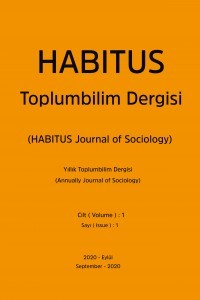BULGARIAN’S ATTITUDES ON COVID 19: SOCIAL OPTIMISM OR REALITY DISTORTION
COVID-19, Sociological interpretation, Pandemic, Crisis, Illness, Masks, Vaccination, Mortality
BULGARIAN’S ATTITUDES ON COVID 19: SOCIAL OPTIMISM OR REALITY DISTORTION
COVID-19, Sociological interpretation, Pandemic, Crisis, Illness, Masks, Vaccination, Mortality,
___
- Reference 1: Тодорка Кинева. (2021). Ваксините срещу Ковид 19 през погледа на българските граждани, Икономически и социални алтернативи, бр. 4 (63-71) DOI: https://doi.org.10.37075/ISA. 2021.4.05. [Todorka Kineva. (2021). Vaccines against Covid 19 through the eyes of Bulgarian citizens, Economic and Social Alternatives, (63-71), DOI: https://doi.org. 10.37075/ ISA.2021.4.05.]
- Reference 2: Aiken, M. (2016). The Cyber Effect, Spiegel & Grau.
- Reference 3: Anis, A. et al. (2020). A bibliometric Analysis of Corona O Pandemic in Social Sciences: A Review of Influential Aspects and Conceptual Structures, 10.1109/Access.2020.3008733.
- Reference 4: CDC. (2021). Morbidity and Mortality Weekly/ Covid-19 Incidence and Death Rates Among Unvaccinated and Fully Vaccinated Adults with and Without Booster Doses During Periods of Delta and Omicron Variant Emergence - 25 Jurisdictions, April 4 - December 25, 2021. Recent data is from January 28, 2022/71(4) 132-138. www.cdc.gov.
- Reference 5: CERC. (2019). Psychology of a Crisis, 2019 update. U.S.Department of Health and Human Services CDCP. emergency.cdc.gov.
- Reference 6: CERC. (2022). Psychology of a Crisis 2019 update. U.S. Department of Health and Human Services CDCP. emergency.cdc.gov.
- Reference 7: Chaudhuri, M. (2021). Webinar, 25.10.2021, hold by International Sociological Association.
- Reference 8: COVID-19 Data Explorer. (n.d.). Our World in Data. Retrieved February 1, 2022, from https://ourworldindata.org/coronavirus-data-explorer.
- Reference 9: Connell, R. (2020). COVID-19/Sociology. July 29, 2020. https://doi.org/10.1177/1440783320943262.
- Reference 10: Demetriou, L. (2021). The Impact of the Covid-19 Lockdown Measures on Mental Health and Well-Being and the Role of Resilience: A review of Studies in Cyprus. IOSR JHSS, 26 (4):54 DOI: 10.9790/0837-2604035465.
- Reference 11: Drury, J. et al. (2016). Emergent social identity and observing social support predict social support provided by survivors in a disaster: Solidarity in the 2010 Chile earthquake, https://doi.org/10.1002/ejsp.2146.
- Reference 12: Drury, J., Reicher, St. (2005). EJSP, Explaining enduring empowerment: A comparative study of collective action and psychological outcomes. 2005, 35, 35058.
- Reference 13: Felici Cohen-Chen, S., Zomeran, M.Van. (2018). https://doi: 10.1016/j.jesp.2018.03. 016. Fernandes-Jesus, M. et. al. (2021). More Than a Covid-19 Response: Sustaining Mutual Aid Groups During and Beyond the Pandemic Front. Psychol., October, 20, 2021 https://doi.org/10.3389/fpsyg.2021.716202.
- Reference 14: Haslam, A. et. al. (2020). The new psychology of Leadership. Routledge, 9780815363828.
- Reference 15: Hogan, M.J. (2020). Collaborative Positive Psychology: solidarity, meaning, resilience, wellbeing and virtue in a time of crisis. International Review of Psychiatry.
- Reference 16: Jingjing Gao et al. (2021). Death by political party: The relationship between COVID-19 deaths and political party affiliation in the United States, World Med Health Policy. June 2021.www://pubmed.ncbi.nlm.nih.gov.
- Reference 17: Krastev, I. (2021). From the silent majority to the unvaxxed minority, NYT, Dec. 24, 2021 OPINION Guest essay.
- Reference 18: Lupton, D. et al. (2021). The Facemask in Covid Times: A Sociomaterial Analysis. De Gruyter. https://doi.org/10.1515/ 9783110723717, Vitalities Lab, UNSW: Sydney, Australia.
- Reference 19: Maestripieri, L. (2021). The Covid-19 Pandemics: Why Intersectionality Matters. Front. Sociology, 26 March 2021 | https://doi.org/10.3389/fsoc.2021.642662.
- Reference 20: NYT The two Covid Americas Jan.25, 2022, David Leonhardt analysis on the Times’s poll.
- Reference 21: Recchi, E. (2021). Researching and Understanding Covid Societies: Sociology and Beyond, International Science Council. www://council. science.
- Reference 22: Reicher, St. (2021). Webinar, 29.04.2021, hold by International Sociological Association.
- Reference 23: Ungar, M. (2019). Change Your World, Sutherland House, 978-1-9994395-2-1.
- ISSN: 2718-0433
- Yayın Aralığı: Yıllık
- Başlangıç: 2020
- Yayıncı: Mine ALPTEKİN
COVID-19’UN ECZACILARIN GÜNDELİK HAYAT PRATİKLERİNE YANSIMASI
THE COVID-19 AND ITS IMPACT ON INDIAN SOCIAL LIFE: LIVED EXPERIENCES OF MUSLIMS AND DALIT COMMUNITY
ÖĞRETMENLERİN TEMEL SORUNLARI TRABZON VE AKÇAABAT İLÇESİ ÖRNEĞİ
BAUMAN’NIN ÖZGÜRLÜK VE BELİRSİZLİK ANLAYIŞINDA İŞSİZLİK VE COVİD 19 PANDEMİSİ ETKİSİ
RE-ORIENTING CURRICULUM OF TOURISM EDUCATION IN THE CONTEXT OF COVID-19: AN EMPIRICAL STUDY
Venkata Rao YEDLA, E Joshu AJOON
TURİZMDE KURUMSAL HABİTUS: ÖZEL ÜNİVERSİTE VE DEVLET ÜNİVERSİTESİ ARASINDA BİR KARŞILAŞTIRMA
COVID-19 PANDEMİ ETKİSİ ARAŞTIRMALARI ÜZERİNE SOSYOLOJİK BİR İNCELEME
Hakan ARIKAN, Şeymanur AYTEKİN
CUMHURİYET HALK PARTİSİ KADIN MİLLETVEKİLLERİNİN TOPLUMSAL PROFİLİ
GIVING BACK TO HUMANITY IN COVID-19 TIMES - AN INITIATIVE OF BMDA IN THE CITY OF VADODARA
